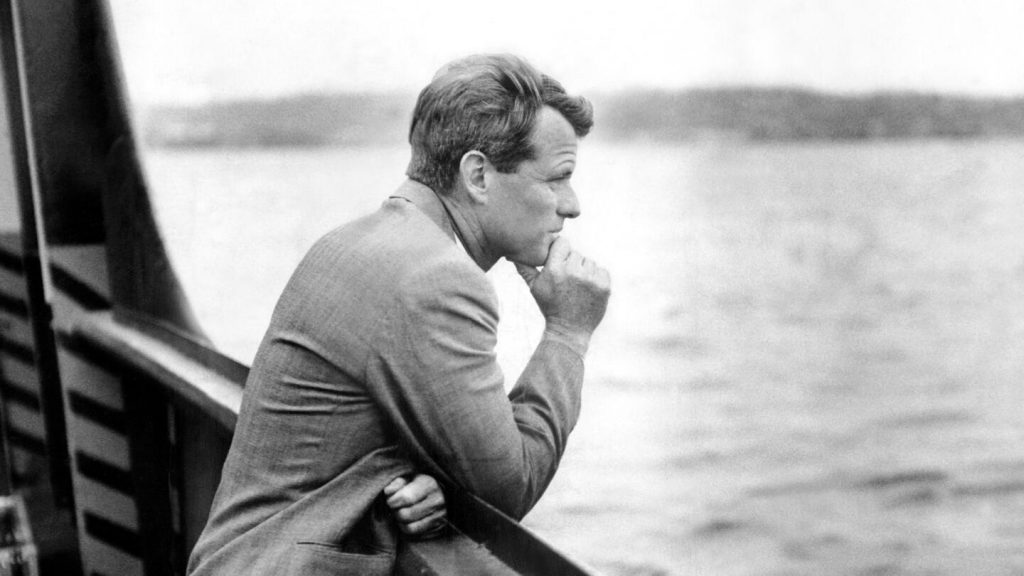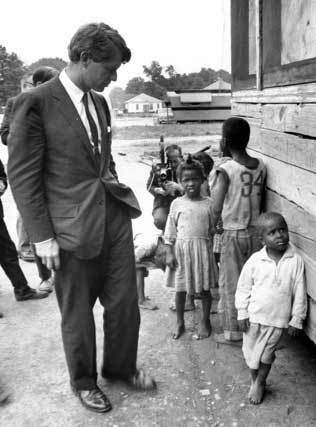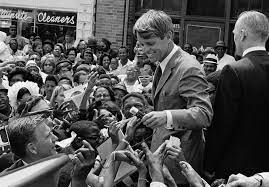The Biggest “What if” in History
In the matter of a split second, the course of history can change forever. On June 5, 1968, Robert F. Kennedy (“Bobby”) was shot by a lone assassin, Sirhan Sirhan. Robert Kennedy died of his wounds on June 8, 1968. He was just 42 years old. His death discharged gasoline on an already burning nation. In 1968, we saw the assassination of Rev. Martin L. King, social unrest, racial injustice, and the escalation of the unwinnable war in Vietnam.
It is this writer’s perspective that if Robert Kennedy won the presidency in November of 1968, his election would have forever changed the course of American and World history. Bobby was on his way to winning the Democratic Party nomination for President after his victory in California. However, fate and Sirhan Sirhan changed all that.
So, we will never know what a President Robert F. Kennedy would have brought to this nation or to the world. It is my observation, had Bobby became President in 1968, the racial divide would not be as divisive as it is today. I reviewed some of Bobby’s speeches addressing the issue of racial injustice to arrive at this conclusion. Some of the speeches that impacted me the most are detailed below.
Discrimination of 1968 and Today
The scenes of racial injustice in 1968 were more open and pronounced than it is today. Peace marches and urban riots were seen daily on the nightly news. What is worse about today’s racial injustice is that it is hidden. Today, society does not openly discriminate, ironically, this is because of the Civil Rights legislation passed during the 1960’s.
However, discrimination is still present in the laws we pass. Case in point, contemporary voting rights legislation passed in Texas, Georgia, and elsewhere. These laws were passed to “make elections fair,” however, they only hurt the minorities in urban cities. Tax legislation is passed to help the wealthy at the expense of the poor. The laws make it easier for the wealthy to avoid paying taxes. However, the poor must continue to pay “its fair share.” Immigrations laws are passed to keep a certain minority out of the United States, because the minority is wrongly deemed rapists, drug dealers, or killers.
The Heir Apparent
During his brother’s presidency, as Attorney General, Bobby worked for equal justice, coordinated a Civil Rights policy, played a role in the desegregation of Southern schools and universities, and aided voting rights legislation in the South. These things made Bobby Kennedy his own person, aside from his brother. While President Kennedy believed in these policies, but he also knew they were political footballs. No one wanted to legislate such policies for fear of losing an election. Bobby inherently knew these policies were good for America, and President Kennedy let Bobby run the field.

After his brother’s death, Bobby became the heir apparent to a family dynasty that created the American Camelot. Bobby was indifferent to the title and privilege. Many believed they could reincarnate John Kennedy with Robert Kennedy. However, Bobby could see through this. There was no king in America. Yet, he was torn between his brother’s legacy and wanting to be his own man.
Pierre Salinger (John F. Kennedy’s Press Secretary and close confidant to Bobby) believed after his brother’s assassination; Bobby changed. It made him experience his own suffering, and the suffering of others; who felt they also lost a family member on November 22, 1963.
In 1964, in spite of the name recognition, in spite of his family’s wealth, Bobby decided he could not sit on the sidelines and entered the New York Senate race. Yes, he would become his own man, but always seeing the shadow of his brother. Now, let us look at some of Bobby’s speeches and see what might have been.
September 9, 1964 – Rochester Civic Center
In 1964, racial equality was not just restricted to the South. In the Spring and Summer of 1964, civil rights demonstrations always yielded counterdemonstrations. The cities of New York and Rochester had their fair share of demonstrations and violence. During his New York Senate campaign on September 9, 1964, Bobby went to Rochester and was warned not to speak of blacks and civil rights as the city was still shaken from the riots. Bobby was expected to speak at the Rochester Civic Center to a mainly white majority crowd. The crowd even filled over into the streets. He pushed himself, as he normally had to, to the microphone and made the following opening extemporaneous remarks.
“It would have been easier not to try to bring this matter up, but there are problems we are all going to have to face. I’m referring to the problems of races living together. In the South you can pass legislation to permit a Nego to have an ice cream cone at Howard Johnson’s but you can’t pass legislation to automatically give a Negro an education. I believe the community must provide education so there can be jobs.” Witnesses reported, at first the crowd was silent, then from the back of the auditorium to the front the applause grew and spread.
Bobby had a way of showing cause and effect. He believed one way to racial equality was equal education for all. He went further and noted that education would bring jobs and jobs will level the playing field of racial equality. Bobby was playing both sides of the same coin; jobs and education would achieve racial equality. While black citizens were given a counter seat at a Howard Johnson’s, they were still not guaranteed an equal education. He acknowledged blacks were making progress but Bobby wanted more for racial equality and America.
During his Senate campaign, Bobby made appearances for racial justice in places where he was told not to go, mainly in the Southern States. He went to the Universities of Mississippi and Alabama in March 1965 and received surprising support.
October 22, 1966 – University of California at Berkely
On October 22, 1966, Bobby addressed students at the University of California, Berkely. Prior to his appearance, the University was the hotbed of dissent. In 1964, the campus earned a distinction of being the first American University to experience a massive student sit-in. The sit-in was the result of protests against the war in Vietnam and racial equality. Earlier in 1966, the students successfully cut short a speech given by Arthur Goldberg, U.S. Ambassador to the United Nations, by heckling and carrying signs of discontent and anger.
Needless to say, the University was not a place politicians wanted to give a speech. However, Bobby felt a need to unveil his empathy toward black Americans. He also reiterated the promises made to black Americans was not enough. After a full day of campaigning in California, Bobby appeared at a lone lectern and delivered the following remarks.
“We have held out the promise that color shall no longer stand in the way of achievement of personal fulfillment or keep a man from sharing in the affairs of the country. We have unveiled the prospect of full participation in American society, while television, radio, and newspapers bring every Negro home the knowledge of how rewarding such participation can be. With so bountiful a promise, how much greater must be the frustration and the fury of the Negro…For him the progress of the past can count for little against the crushing awareness that his hopes for the future are beyond his reach for reasons which have little to do with justice or his worth as a man.”
Then in a single statement Bobby brought both a challenge and reality to the audience. “But if any man claims the Negro should be content or satisfied, let him say he would willingly change the color of his skin and go to live in the Negro section of a large city. Then, and only then, has he a right to such a claim.”
March 18, 1968 – University of Kansas – The Division and Discrimination of the Poor
It is ironic that a man born into one of the wealthiest families in America knew more about American poverty than the average American. As a Senator, Bobby sat on the Senate Subcommittee on Poverty. One particular testimony, from Marian Wright, a Yale Law School graduate working with the NAACP’s Legal Defense Fund in Mississippi, moved him so much that in April 1967, he decided to go to Mississippi.
According to one aide with Bobby during the trip, they had stopped in a household and Bobby learned of a boy whose diet consisted of molasses. Bobby responded and said, “I’ve been to Third World countries and I’ve never seen anything like this.”
At the next house, Bobby met a woman with seven children. Roaches had taken over the house and were everywhere. A child was playing on the roach infested floor. The child was covered in sores and had a distended stomach. It was said that Bobby sat down and rubbed the boy’s cheek. According to the aide, Bobby then uttered, “my God, I didn’t know this kind of thing existed! How can a country like this allow it? Maybe they just don’t know.” Bobby attempted to talk to the child. When he didn’t get a response, the aide said Bobby began to cry.
On March 18, 1968, at the University of Kansas, Bobby made it known what he had witnessed. He professed America must not simply ignore the poor but change and shape policy to help them.

Bobby came from a rich family. However, he would show empathy for the poor.
“And if we seem powerless to stop this growing division between Americans, who at least confront one another, there are millions more living in the hidden places, whose names and faces are completely unknown – but I have seen these other Americans – I have seen children in Mississippi starving, their bodies so crippled from hunger and their minds have been so destroyed for their whole life that they will have no future. I have seen children in Mississippi – here in the United States – with a gross national product of $800 billion dollars – I have seen children in the Delta area of Mississippi with distended stomachs, whose faces are covered with sores from starvation, and we haven’t developed a policy so we can get enough food so that they can live, so that their children, so that their lives are not destroyed, I don’t think that’s acceptable in the United States of America and I think we need a change.”
April 4, 1968 – Addressing a Crowd in Indianapolis, Indiana on the Death of Martin Luther King
Then just when black and poor Americans felt things could not get worse, on April 4, 1968, Martin Luther King, Jr. was assassinated. King seemed to predict his own death. On April 3, 1968, King gave a speech in Memphis, Tennessee, which prophesied his final days ahead. “Well, I don’t know what will happen now; we’ve got some difficult days ahead. But it really doesn’t matter with me now, because I’ve seen the mountaintop…I’m not worried about anything; I’m not fearing any man. Mine eyes have seen the glory of the coming of the Lord.”
When Bobby received word of King’s assassination, he was in Indiana campaigning. He was notified by Salinger of the incident and that King was holding on for his life. Upon landing in Indianapolis, Bobby was told that King had died. The crowd gathered in the neighborhood Bobby was scheduled to speak was located inside an Indianapolis ghetto. The crowd did not hear that King had passed. The Indianapolis Chief of Police, Winston Churchill, told Bobby not to go because he expected there would be violence once the news reached the crowd.
There was no talking Bobby out of going. He believed someone had to be there for the sake of tempering the devastating news. Bobby still carried the memory of when his brother was assassinated. FBI Director J. Edgar Hoover called Bobby and told him, “The President been shot.” Hoover gave no further details and simply hung up the phone. No Bobby did not wish that type of treatment on anyone. He felt an obligation to talk directly to the people this news would hurt the most; those waiting for him in the ghetto.
When his car entered the black ghetto, the police escort stopped following him. An aide attempted to hand him a prepared statement when Bobby exited the vehicle. He simply said, “thanks,” crumbled it and put it in his pocket. Bobby told his men not to formally introduce him and he climbed onto a flatbed truck that served as a platform. A television correspondent reported that floodlights were the only illumination delivered to the man on the back of the pickup truck. Bobby looked into the crowd and told them to please put their campaign signs down. With a trembling but firm voice Bobby then delivered the news and gave the following extemporaneous speech.
“I have bad news for you, for all of our fellow citizens, and people who love peace all over the world, and that is Martin Luther King was shot and killed tonight.” Screams of “no” came from the crowd. The screams echoed of shock and anger.
Bobby knew he could not turn and walk away from the crowd once he delivered the news and went on to plea for the decency of man. “We can do well in this country. We will have difficult times; we’ve had difficult times in the past; we will have difficult times in the future. It is not the end of violence; it is not the end of lawlessness; it is not the end of disorder. But the vast majority of white people and the vast majority of black people in this country want to live together, want to improve the quality of our life, and want justice for all human beings who abide in our land.”
Bobby then ended with a quote he dared to live by, “Let us dedicate ourselves to what the Greeks wrote so many years ago: to tame the savageness of man and make gentle the life of the world.”
June 4, 1968 – California Primary Victory Speech and the Shot that Changed History
On June 4, 1968, just two months after the death of Martin Luther King, Bobby Kennedy won the California Primary for the Democratic Nomination. He was well on his way to winning his party’s nomination for the Presidency of the United States. His speech was not long. It didn’t have to be. Bobby had already laid out the vision he had planned for America should he win. The voters knew who he was, and what he stood for. Bobby hide nothing about what his policies would be. So, in his victory speech, Bobby just focused on a divided America and the need to unit it.
“I think we can end the divisions within the United States. What I think is quite clear is that we can work together in the last analysis. And that what has been going on with the United States over the period of the past three years – the divisions, the violence, the dis-enchantment with our society, the division whether it’s between blacks and whites, between rich or poor and the more affluent, or between age groups, or over the war in Vietnam – that we can start to work together again. We are a great country, an unselfish country, and a compassionate country. And I intend to make that my basis for running over the period of the next few months.”
Shortly after Bobby delivered this speech, he was shot and later died; another flame extinguished. The hope he gave to so many lost. His brother, Senator Ted Kennedy, gave Bobby’s eulogy and could not have put a more fitting ending to a more complex life.
“My brother need not be idealized, or enlarged in death beyond what he was in life; to be remembered simply as a good and decent man, who saw wrong and tried to right it, saw suffering and tried to heal it, saw war and tried to stop it. Those of us who loved him and who take him to his rest today, pray that what he was to us and what he wished for others will some day come to pass for all the world.”
Conclusion: Bobby and “What if?”
There is no telling what a Robert F. Kennedy Presidency would have been like or how it would have changed history. History is not the result of an equation put together by “what ifs.” History can only be composed of what happened.

But as you can see from his speeches and the way he showed character and humility, Bobby would never have wanted his legacy to be made up of “what ifs.” He would want his legacy to be made up of the belief and hope that America can stand united; if not only to protect democracy but to protect one another.
Bibliography
Guthman, Edwin O. and Allen, Richard, C. RFK: His Words For Our Times. New York: Harper Collins Publishers, 2018.
MacAfee, Norman. The Gospel According to RFK: Why It Matters Now. Boulder, Colorado: Westview, 2004.
Matthews, Chris. Bobby Kennedy: A Raging Spirit. New York: Simon & Schuster, 2017.
Steel, Ronald. In Love With Night: The American Romance With Robert Kennedy. New York: Simon & Schuster, 2000.
Leave a Reply